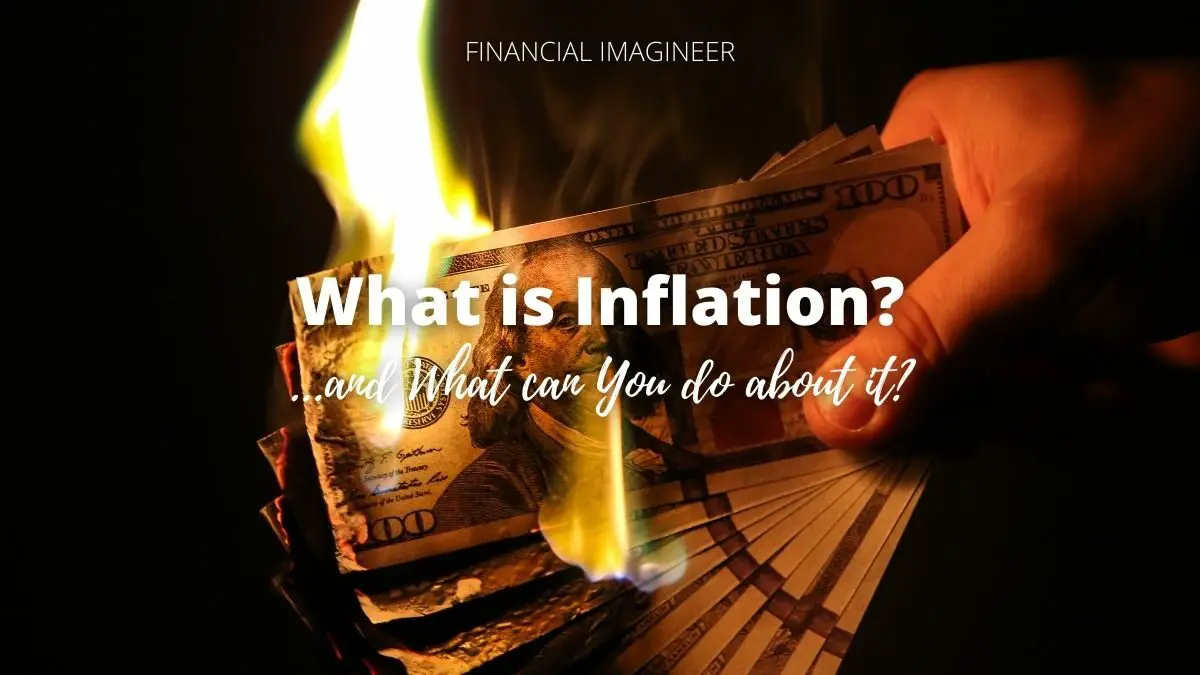Inflation is a phenomenon that has been around for centuries, but in recent years it has made headlines more often. Recently, the inflation rate surged up to 8.5%. In this blog post, we will deep-dive into what inflation is and what causes it. We will also explore how inflation affects us and what we can do about it. Inflation is slowly impacting all of us, so it’s important to become aware of it and take precautions against it!
If inflation continues to soar, you’re going to have to work like a dog just to live like one.
George Gobel
What is inflation?
Inflation is when your money loses its purchasing power [gradually].
That means, if you have $100 today and inflation is at a rate of 2%, then next year you would only be able to buy goods or services that cost $98. In other words, inflation erodes the value of your money over time.
Inflation is when you pay fifteen dollars for the ten-dollar haircut you used to get for five dollars when you had hair. Click To Tweet
Two millennia ago, the roman empire already had to deal with inflation. They used precious metals such as silver and copper to mint their coins.
Over time, the government increasingly debased the quality of the coins by adding less and less precious metals. This led to people losing faith in the currency and inflation took off.
While the phenomenon of inflation is as old as money itself, what has changed is the speed at which it happens. Just have a look at how the USD and the GBP lost ground versus other currencies after the gold standard and Bretton Woods system got uplifted in 1971.
Money has been around for a long time. Its evolution is a process that will continue indefinitely and will be shaped by the constantly changing needs of its users. Understand the functions and evolution of money.
I do not think it is an exaggeration to say history is largely a history of inflation, usually inflations engineered by governments for the gain of governments.
Friedrich August von Hayek
Nowadays, as paper money can be printed and virtual money can be added into the system at the ease of a fingertip of a central banker, we better keep inflation on the radar for the time being.
Inflation can happen suddenly, or it can happen gradually over time.
Central banks keep a 2% annual inflation as their goal, and for most of the past 20 years it was somewhat below that, but recently there seem to be some changes to that.
Why 2% inflation is desireable you may ask?
Check out the official July 1996 US FED meeting minutes right here, read from page 43 onwards.
The above is a must read if you’re serious to understand inflation. It’s the most relevant dialogue between Janet Yellen and Alan Greenspan explaining their thoughts on inflation!
How much money is in the world?
…around $40 trillion, in 2022 USD that is!
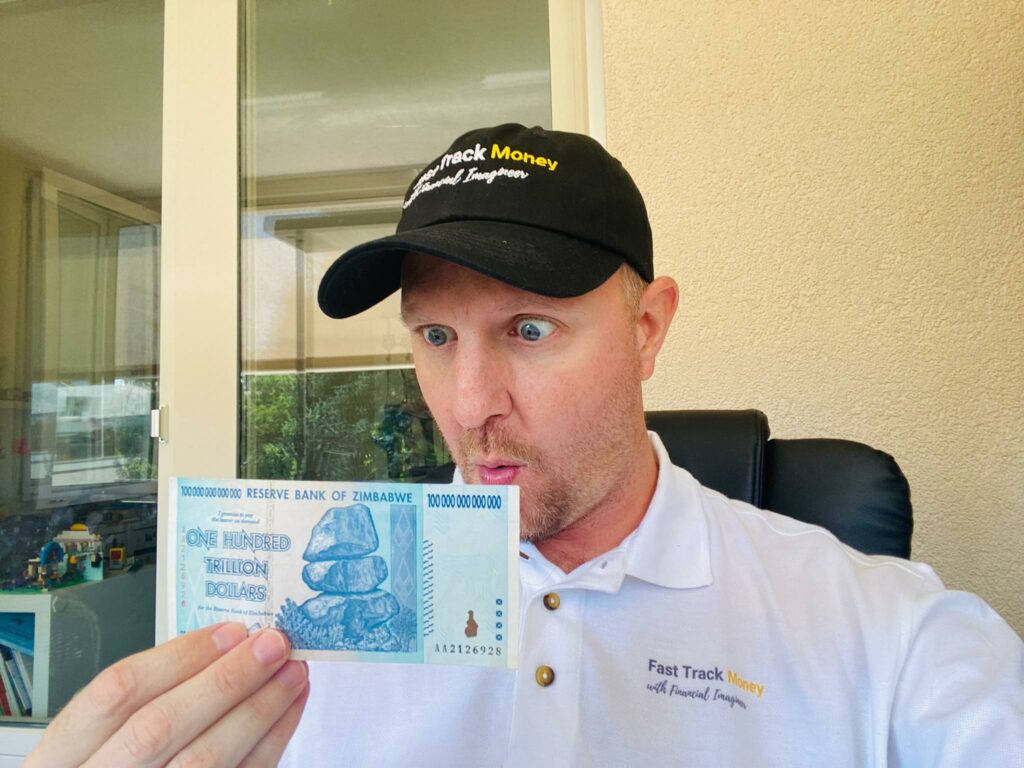
While there is around $40 trillion in physical money present globally. This amount can touch a quadrillion if cryptocurrencies, broad money (M2 and M3) and investments and derivatives are added to that total!
Just imagine.
What Causes Inflation?
There are many different theories about what causes inflation, but most economists agree that there are two main factors: an increase in the money supply and a decrease in the production of goods and services relative to the amount of money in circulation.
The most common one is “too much money chasing too few goods”.
A simple question of supply and demand, price and value.
When there is more money in circulation than what is available in terms of goods and services, prices will go up as people compete for what is available.
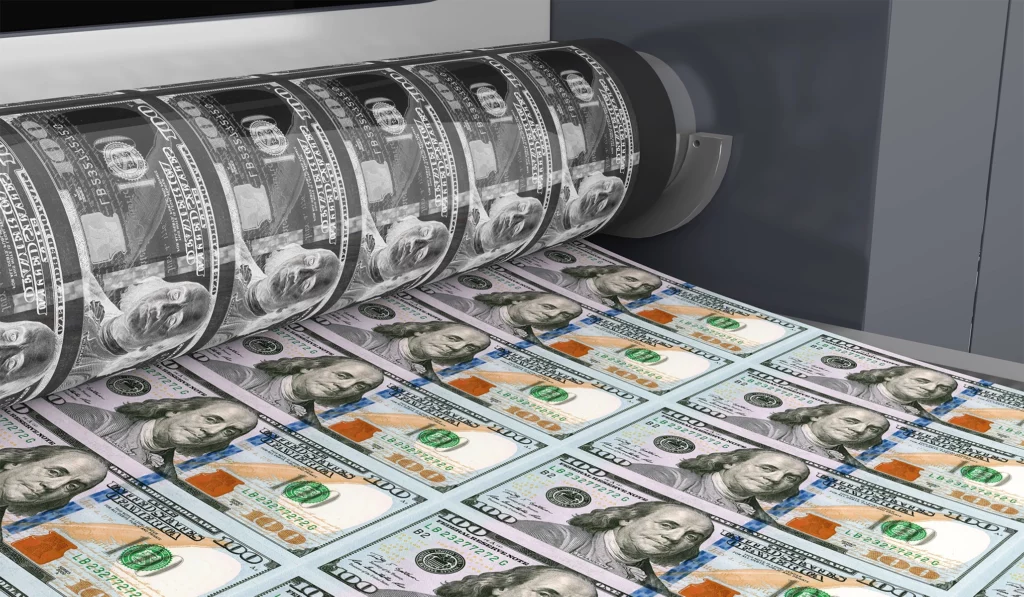
When the money supply goes up, each unit of currency becomes worth less because there are more units available. This increase in the money supply can be caused by a variety of factors, including:
- The government printing more money
- Banks lending more money than they have on deposits, banks’ reserve ratio
- More credit being available, lower interest rates, lower credit requirements
- A decrease in taxes, people suddenly have more disposable money
All of the above factors can lead to an increase in spending, which can cause prices to go up and inflation to occur.
Inflation reflects the broad rise of prices or the fall in the value of money. It generally results from too much demand chasing too few goods or limited services, leading to price increases.
How does Inflation Impact Us?
The consequences of inflation affect us in a variety of ways.
Some effects are beneficial to us, while others are damaging. It is critical to understand these key drivers.
You can use inflation to your advantage if you understand some implications.
Inflation is like a hidden tax that we all pay. As the prices of goods and services go up, our purchasing power goes down. For example, if the inflation rate is higher than the interest rate on our savings account, then we are losing money in real terms (after taking inflation into account) by keeping our cash aside.
On the other hand, if inflation is higher than the interest rate we are paying on our mortgage, then we are effectively getting a discount on what we owe (in real terms) as our debt shrinks faster in purchasing power parity terms.
Inflation destroys savings, impedes planning, and discourages investment. That means less productivity and a lower standard of living.
Kevin Brady
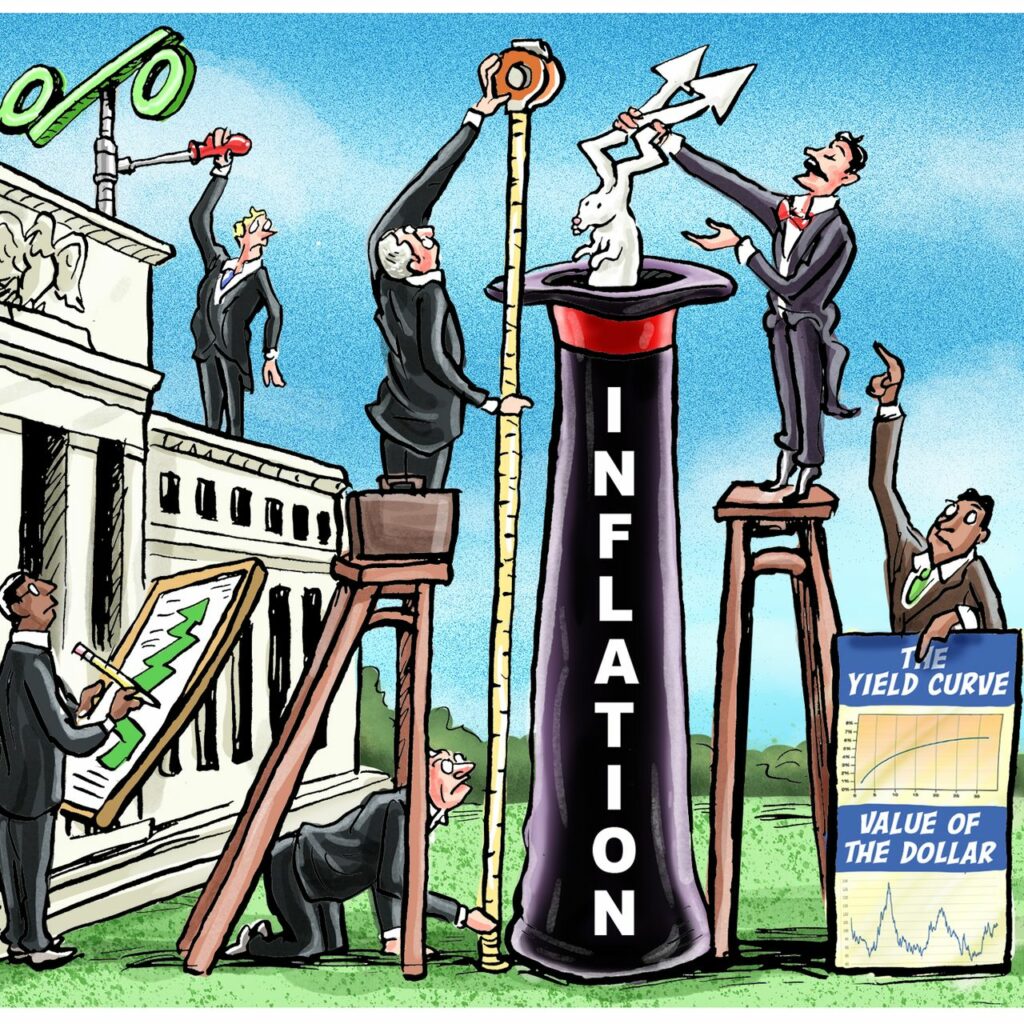
A brief list of how inflation affects us:
- The cost of living goes up as the prices of goods and services increase. This is what we experience day-to-day as we see the prices of groceries, gas, and other necessities rise.
- Wages may not keep up with inflation. As the cost of living goes up, our wages may not increase at the same rate, which means we ultimately might have less purchasing power.
- Savings lose value. When inflation is higher than the interest rate on our savings account, our money isn’t keeping up with inflation and is losing value.
- Debt becomes easier to pay off. While this is a good thing if you have outstanding debt (e.g. your mortgage, companies have outstanding bonds or governments have treasury bills), it’s bad for lenders or investors because they will be paid back in future dollars that are worth less than when they used to be.
Inflation is taxation without legislation.
Milton Friedman
- Shrinkflation is when companies start to decrease the size or quantity of their products while keeping the price the same. You may have experienced how some soft drink bottles get smaller, how less pasta is filled in some boxes, or how packaging size changes. This is a way for companies to maintain (or even increase) profits without raising prices but with frustrating woke customers who take notice.
- Some companies simply leave away some items that used to be included before, e.g. if you buy a new smartphone but the headsets and charger are no longer included.
- Imported goods become more expensive as the domestic currency weakens against foreign currencies. This can lead to inflationary pressure as well.
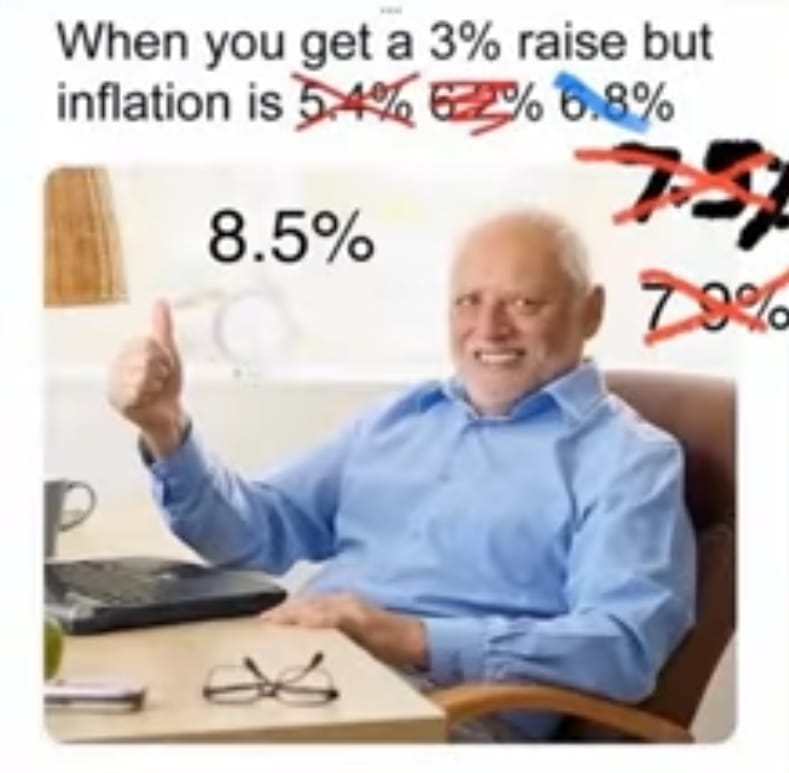
Inflation erodes purchasing power or how much of something can be purchased with currency and because it erodes the value of cash, it encourages consumers to spend more money faster.
It is a way to take people’s wealth from them without having to openly raise taxes. Inflation is the most universal tax of all.
Thomas Sowell
A quantitative estimate of the rate at which the decline in purchasing power occurs can be reflected in the increase of an average price level of a basket of selected goods and services in an economy over some time, the CPI or consumer price index.
Inflation is viewed as a positive when it helps boost consumer demand and consumption, driving economic growth. It lowers the cost of borrowing and reduces unemployment.
What Can You Do About Inflation?
There are a few things you may do to preserve the purchasing power of your money and even make money from it when it comes to inflation, for my part I manage inflation with a combination of the below:
- Buy assets that will go up in value as inflation rises. These include commodities, precious metals such as gold and silver, or collectibles such as art or antiques. Build wealth!
- Invest in real estate. As the cost of living goes up, so does the price of rent and property values. The bonus: By taking out a loan, you unlock the power of leverage and profit from inflation at both ends. A prime borrower who locked in a mortgage at super-low interest rates (significantly lower than the current pace of inflation) should not consider pre-paying his mortgage.
- Buy farmland (stocks or REITs), which are a natural hedge and will go up in value as the price of food rises with inflation. In this space, as with REITs in general, make sure you understand the leverage ratio within your investment as high inflation might also increase the credit cost for such sometimes geared companies!
- You can also profit from inflation by investing in stocks of companies that will benefit from it. These include companies that have goods and services with stable demand, strong brands, and potentially global franchises. They must have pricing power and the ability to maintain their margins to withstand inflation.
- Hold cash in a high-yielding account such as a money market account or a short-term certificate of deposit (CD). These accounts offer higher interest rates than savings accounts, which means your money will grow faster and keep up with inflation.
- You can also hedge against inflation by investing in TIPS (Treasury Inflation-Protected Securities). TIPS are bonds issued by the US government that are designed to protect investors from inflation. However, beware the pricing of these notes is more based on inflation estimates rather than real CPI prints.
- Convert some local into stronger foreign currencies, which may hold their value better than your domestic currency during periods of high inflation. Just be sure to do your homework first to avoid any nasty surprises here. Explore unlocking geographic arbitrage.
- Crypto-currencies are a new asset class, which some people believe will go up in value during periods of high inflation. I do not hold any cryptos myself (disclaimer) but do know some investors that I respect who hold some as an inflation hedge. I am still very cautious about this new asset class though. Explore my interview with a self-made 8-figure Bitcoin Millionaire here.
Inflation is as violent as a mugger, as frightening as an armed robber and as deadly as a hit man.
Ronald Reagan
While there is no guaranteed way to protect your money from inflation, diversifying your investments across different asset classes is one of the best ways to hedge against it. If you own a mix of the above you will be well set to shelter your purchasing power through a period of higher inflation.
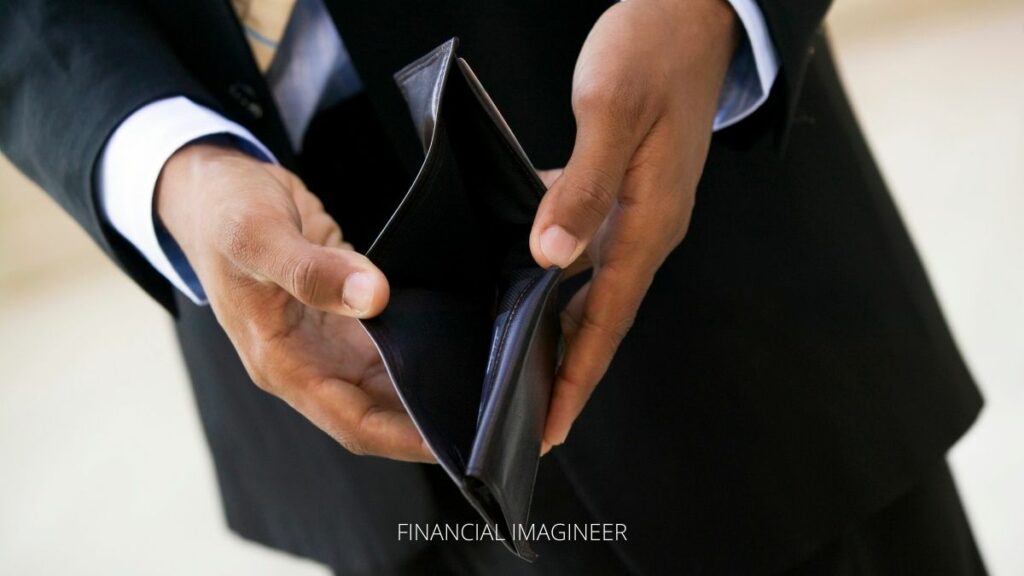
Stay Aligned with the Big Players
Inflation allows borrowers to pay lenders back with money worth less than when it was originally borrowed, which benefits borrowers. When inflation causes higher asset prices, the demand for credit increases, raising interest rates, which benefits lenders and their margins again.
There are only three ways to meet the unpaid bills of a nation. The first is taxation. The second is repudiation. The third is inflation.
Herbert Hoover
Inflation makes it easier for governments to repay outstanding debt, as it shrinks relatively to nominal GDP. They can “inflate away” debt. Governments also profit from increases in nominal tax revenues as higher prices will create more VAT, and workers pay more income tax as they gradually end up in higher tax brackets.
Invest in inflation. It’s the only thing going up.
Will Rogers
The biggest players in this game are the central banks and governments of this world. They consider moderate inflation of around 2% as healthy and necessary for sustainable economic growth as shown above. Here again the link to the official July 1996 US FED meeting minutes (same as above), read from page 43 onwards. I repeat, this is the most relevant dialogue between Janet Yellen and Alan Greenspan explaining their thoughts on inflation!
By a continuing process of inflation, government can confiscate, secretly and unobserved, an important part of the wealth of their citizens.
John Maynard Keynes
Conclusion
Inflation is a complex topic, but what we can say for sure is that it’s not going away anytime soon. We hope this article has helped you understand what inflation means and what impact it will have on your [personal] finances in the future.
Inflation is like a toothpaste. Once it's out, you can hardly get it back in again. Click To TweetThe best way to protect yourself from inflation may be by diversifying your investments across different asset classes. Also consider how the big players are likely to react if higher rates of inflation do happen. Align yourself with the big boys and win the game.
Remember: Interest rates do compound and compounding works both ways!
If you have any questions about inflation, investing, financial independence, [early] retirement, or life in general, consider booking a free consulting call with me right here.
Stay tuned for more financial literacy and finspiration!
Consider subscribing to my blog in the box below, give me a follow on Twitter, like my Facebook page and feel free to check out more content here.
Happy investing!
Matt
